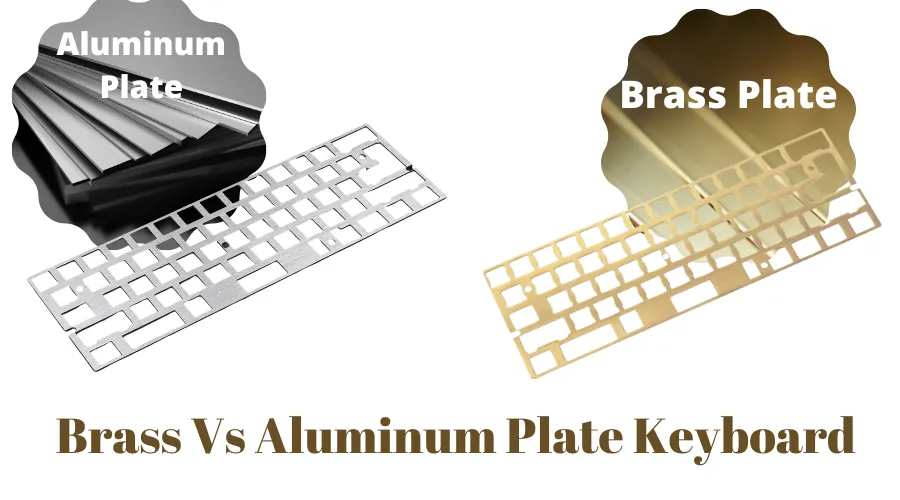When choosing a material for your plates of a mechanical keyboard, there are two main options: brass and aluminum. Both have their own benefits and drawbacks, so it’s essential to choose the right one for your needs.
In this blog post, we will go over some of the key comparisons of brass vs aluminum plate keyboards so that you can make the best decision for your keyboard.
So, what are the differences between brass and Aluminum plate Keyboards?
The main difference is that Brass is a denser material than Aluminum, so, Aluminum plate keyboards of similar dimensions as a Brass Plate keyboard are much lighter.
Also, the Brass Plate Keyboards come at a premium cost than an Aluminum Plate keyboard.

Let’s get started!
Brass vs Aluminum Plate Keyboard
| Brass Plate Keyboard | Aluminum Plate Keyboard | |
| Metal Used | Brass | Aluminum |
| Material Density | More than Aluminum | Less than Brass |
| Durability | Durable | Durable |
| Weight | Heavier | Lightweight |
| Cost | More Expensive | Cheaper |
Aluminum Plate Keyboard
Aluminum plate mechanical keyboards are some of the most popular keyboards on the market. They are known for their durability and their sleek, minimalist design. But what exactly is an aluminum plate keyboard?
An aluminum plate keyboard is a keyboard that has an aluminum plate mounted on the back of the PCB.
This plate provides extra support to the PCB, which helps to prevent flexing. It also helps to dissipate heat, which can be an issue with some PCBs.
Aluminum plate keyboards are available in a variety of different sizes and shapes.
Pros of Aluminum Keyboard Plates
- Aluminum is a strong and durable material that can withstand a lot of wear and tear.
- It’s also a very light material, so it won’t add a lot of weight to your keyboard.
- Aluminum has a very high thermal conductivity, so it’s great for dissipating heat. This is especially important if you’re using high-powered LEDs or other components that generate a lot of heat.
Cons of Aluminum Keyboard Plates
- It’s also a very conductive material, so it’s important to be careful not to short-circuit any of the components on your keyboard.
- Some people find that aluminum keyboard plates are too loud.
Brass Plate Keyboard
Brass plate mechanical keyboards are a type of keyboard that uses brass plates instead of traditional plastic ones.
This gives the keyboard a more solid feel and can help to improve the typing experience.
The brass plates also help improve the keyboard’s sound, making it louder and more satisfying to type on.
This gives the keyboard a more solid feel and can help to reduce key wobble. Brass is a particularly popular choice for this, as it has a nice heft and a warm, golden color.
Of course, there are a few downsides to brass plate mechanical keyboards. They’re generally more expensive. But we think the benefits outweigh the drawbacks, and we hope you’ll agree!
Pros of Brass Keyboard Plates
- Brass keyboard plates have a high-quality look and feel that can give your keyboard a luxurious look.
- Brass is a strong and durable material that will withstand a lot of wear and tear.
Cons of Brass Keyboard Plates
- Brass is a more expensive material than some of the other options, such as aluminum.
- Brass is a relatively heavy metal, so a brass plate keyboard can be quite heavy.
- Brass can oxidize over time, so you will need to clean it regularly to keep it looking its best.
Choosing Between Brass and Aluminum Keyboard Plates
There are many factors to consider when choosing between brass and aluminum keyboard plates for your mechanical keyboard.
Here, we will go over some of the most important factors to help you make the best decision for your needs.
Feel & Sound
One of the most important factors to consider when choosing between brass and aluminum keyboard plates is the feel and sound.
Brass keyboard plates have a heavier feel and produce a deeper, richer sound when typing. Aluminum keyboard plates are lighter and produce a brighter, crisper sound.
Convenience
Brass keyboard plates are generally heavier than aluminum keyboard plates.
This means that they are more likely to slip and move around during use. Aluminum keyboard plates are lighter and therefore offer more stability and are less likely to move around.
Durability
Both brass and aluminum keyboard plates are quite durable. However, brass plates are typically more resistant to scratches and dents.
However, Aluminium provides a lot of durability in plates without adding much extra weight to your keyboard.
Price Point
Finally, price is always a factor to consider. Brass keyboard plates are typically more expensive than aluminum keyboard plates.
However, the price difference is not always significant, and the decision should ultimately come down to the other factors considered here.
Is Brass or Aluminum Better for Keyboard Plate?
It really depends on your personal preferences. If you want a smooth, natural feel to your keyboard, then brass is the way to go.
If you prefer a more extreme typing experience, then aluminum is the way to go.
If you want a keyboard that is more stable and less likely to move around, then aluminum is the way to go.
And if you want a keyboard that is more durable and less likely to show signs of wear over time, then aluminum is the way to go.
Also, choosing between Brass and Aluminum types of Keyboard plates can be different for different types of mechanical switches.
Are Brass or Aluminum Better for Clicky switches?
Metallic Plates on the Keyboard sound loud and the clicky switches on your mechanical keyboard demand that only.
Whether you choose the Brass or Aluminum Type of keyboard plate you will enjoy most cases of clicky switches more than any other type of mechanical switches.
The clicks would feel stable and much more satisfying. And between these, the Brass is better for clicky switches.
Are Brass or Aluminum Better for Tactile switches?
Tactile switches are popular in gaming keyboards, as they provide distinct feedback that lets you know when a key has been activated.
Brass plates work well with tactile switches, as they provide a solid foundation that helps to amplify the tactile feedback.
Aluminum plates can also be used with tactile switches, but they tend to deaden the feedback somewhat.
Both these metallic plates give good feedback and would give added durability to your mechanical keyboard.
Are Brass or Aluminum Better for Linear switches?
Linear switches are the most popular type of switch for mechanical keyboards, as they provide a smooth, consistent keystroke.
Both brass and aluminum plates work well with linear switches, and it’s really a matter of personal preference which you choose.
Brass plates tend to provide a little more stability, while aluminum plates are a bit lighter.
However, as both of these are metal plates, so the sound from the linear switches may be a bit loud. So, to get more silent-sounding ones you can look for other types of plates also.
Do Brass Keyboard Plates Oxidize?
People want to know if their beautiful new brass keyboard will eventually start to show signs of wear and tear. Unfortunately, the answer is yes. All metals oxidize over time, and brass is no exception.
So, while it is true that brass keyboard plates will oxidize over time, there are ways to prolong the life of your investment.
Prevent Brass Keyboard Plate From Oxidation
1. First, make sure to clean it regularly with a soft, dry cloth. This will help to remove any dirt or fingerprints that can accelerate the oxidation process.
2. Second, if you notice any spots starting to form, you can use brass polish to help remove them. Be sure to follow the instructions on the polish, as some can be quite harsh on the metal.
3. Third, if you live in an area with high humidity, consider investing in a keyboard cover. This will help to protect the brass from the moisture in the air, which can cause it to oxidize more quickly.
4. Finally, if you do start to see significant signs of wear, you can always have the keyboard professionally refinished. This will make it look new again, and it will be protected from further damage.
By following the tips above, you can keep your brass keyboard looking new for many years to come.
Other Types of Metal Plate Keyboards Compared
When it comes to choosing a keyboard plate, there are several different types to choose from apart from Brass and Aluminum type Plates.
Polycarbonate Keyboard Plate (PC Plate)
A polycarbonate keyboard plate is a great choice for those who want a durable and lightweight option. Polycarbonate is a strong material that is also resistant to scratches and impact damage.
This type of keyboard plate is also easy to clean and maintain.
Steel Keyboard Plate
A polycarbonate keyboard plate is a great choice for those who want a durable and lightweight option. Polycarbonate is a strong material that is also resistant to scratches and impact damage.
This type of keyboard plate is also easy to clean and maintain.
Carbon Fiber Keyboard Plate
A carbon fiber keyboard plate is a good choice for those who want a lightweight and durable option. Carbon fiber is a strong material that is also resistant to scratches and impact damage.
This type of keyboard plate is also easy to clean and maintain.
ABS Keyboard Plate
ABS is a strong, durable plastic that is resistant to breakage. It’s also lightweight, making it a good choice for portable keyboards. However, ABS can be scratched more easily than some other materials.
FR4 Keyboard Plate
FR4 is a strong, lightweight material that is resistant to breakage. It’s also very stiff, so it provides a good typing surface. However, FR4 can be scratched more easily than some other materials.
Brass vs Aluminium Plate Keyboards FAQs
Q. Is a brass plate good for the keyboard?
Q. Which is stronger brass or Aluminum for keyboard Plates?
Q. How much heavier is brass than aluminum keyboard plates?
So, Brass Keyboard plates are much heavier than Aluminum keyboard plates considering the same dimension of both metal plates.
Conclusion: Which One Should You Choose?
Let’s conclude the post on the Brass vs Aluminium Plate Keyboard!
Both, Brass and Aluminum Plate Keyboards are great for your mechanical keyboard. If you’re looking for the best sound quality, a premium option, then brass is the way to go.
But if you’re on a budget or you’re looking for an easy-to-solder switch, aluminum might be a better option.
I hope you enjoyed reading this post.

I’m Anirban Saha, Founder & Editor of TechBullish. With a B.Tech in Electronics and Communication Engineering, and 6+ years of experience as a software developer, I have expertise in electronics, software development, gadgets, and computer peripherals. I love sharing my knowledge through informational articles, how-to guides, and troubleshooting tips for Peripherals, Smart TVs, Streaming Solutions, and more here. Check Anirban’s Crunchbase Profile here.
